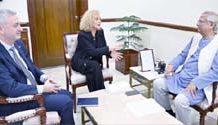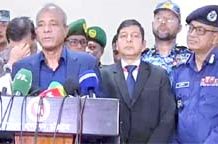C T Online Desk: One of my proudest achievements in government was meeting Britain’s commitment to spend 0.7 per cent of its national income on overseas development. From that fraction flowed some much bigger numbers. Eleven million more children going to school. Twenty-four million mothers and children getting the nutrition they need. Sixty million more people accessing clean water and sanitation. Millions more protected from diseases such as malaria and polio. It was a promise made to the world’s poorest countries – and one that I made sure we kept.
In 2020, the 0.7 per cent commitment was broken. I said at the time that it was a mistake. But I am a realist. Money is tight. Yet the need for investment in developing countries is greater than ever.
The Covid-19 pandemic, Russia’s invasion of Ukraine and catastrophic climate change have been a triple whammy for the poorest nations. Take sub-Saharan Africa. The combination of job losses, crop failures, disrupted supply chains, school closures and increased import prices has been devastating. In the three decades after 1990, the proportion of people living in extreme poverty fell from 38 per cent to just 8 per cent, It is now rising.
Addressing poverty and climate change doesn’t come cheap. It is estimated that $1 trillion more external financing every year will be needed for investment in the green-energy transition and sustainable development, at a time when many rich governments’ revenues have fallen and the price of borrowing has increased.
There is no simple answer to this conundrum, but one of the most important steps we could take is reforming “multilateral development banks” (MDBs). Few people have heard the term, but everybody knows the most famous examples: the World Bank and the International Monetary Fund (IMF). Every continent is served by its own regional establishments.
These institutions have the world’s leading economies as guarantors. They have AAA credit ratings. Their loans are almost always repaid on time. And they do an amazing job of lending to developing countries where commercial finance is limited. You can see the impact of MDB loans and assistance right across the world, from a windfarm in Turkey to a toll road in Indonesia and hospitals in Rwanda.












